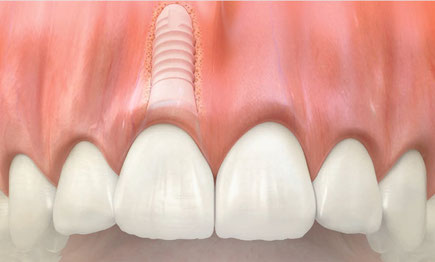In the course of life, natural teeth can be severely damaged or, in the worst case, fall out. This is a stressful situation for many affected people and can severely impair their quality of life.
In our practice we offer you a comfortable, optimally compatible and sustainable solution through the use of metal-free implants. The implants take over the function of an artificial tooth root and thus, together with the visible dental prosthesis in the form of a matching bridge or crown, represent a permanent and stable dental prosthesis with which you can chew, talk and laugh without any problems – without having to fear that a prosthesis will slip.
What exactly are dental implants?
Dental implants are artificial tooth roots which are inserted into the jawbone by our oral and maxillofacial surgeon and dentist Dr. med. Thomas Franke. There they finally grow together with boiling (so-called osseointegration), which results in a firm attachment to the implant surface. This foundation is modelled on the natural tooth adhesion and is ideal for having the visible, final dental prosthesis in the form of a crown or bridge attached to it by a dentist after 3-6 months. Until then, we provide our patients with a previously made temporary denture, so that they can quickly and fully participate in life again.

How are the dental implants inserted?
The insertion of implants into the jawbone is a surgical procedure which is carried out on an outpatient basis in our practice in Berlin Charlottenburg.
Since every person has different requirements, we also prepare each operation conscientiously and individually together with our patients.
Before an operation, we first have our patients’ blood values examined in detail in order to determine or exclude possible concomitant diseases or deficiencies. This procedure enables us to care for our patients during the operation – and also afterwards – in such a way that any side effects of the operation can be minimised and at the same time optimum healing results can be achieved.
After this clarification, we carry out a diagnosis using digital volume tomography (DVT). DVT is an ultra-modern, 3D-based, imaging X-ray procedure with low radiation exposure. It provides us with extremely high-resolution, three-dimensional images of the head area, enabling us to plan the insertion of the implants precisely.
During the actual implantation in the form of an outpatient procedure in our practice in Berlin Charlottenburg, the gums are opened at the planned location in the tooth row where the tooth to be replaced is missing, after local pain elimination. Then an exactly fitting canal is inserted into the jawbone here, into which the artificial tooth root in the form of the biological ceramic implant fits perfectly. After the dental implant is inserted, the area is closed again with the finest suture material and the outpatient procedure is finished. Finally, the previously made temporary denture is attached to the ceramic implant, so that you can take part in life again as soon as possible.
If there is a deficiency or a chronic disease, our patients receive recommendations from us after the treatment to strengthen the immune system in order to achieve the best possible healing results. In addition, we also offer our patients supportive and technologically advanced therapeutic procedures, such as wound healing promotion with PRP/PRGF.
Now the implant has to heal in the bone and under the mucous membrane for 3-5 months. During this time, temporary dentures are usually worn, which have previously been made by the family dentist. In addition, regular checks are carried out to ensure the best possible ingrowth of the implant and optimal wound healing.
After this time, the so-called uncovering of the dental implant takes place. During this procedure the implant is exposed on the surface so that the final dental prosthesis can be permanently attached to it. Since a dental implant carries exactly the crown of the tooth to be replaced, it is not necessary to grind the neighbouring teeth (as is the case with conventional bridges).
In general, the later wearing comfort of an ingrown implant with an aesthetic crown restoration cannot be distinguished from that of a natural tooth. Dental implants and crown or bridge restorations offer patients of all ages a wide range of possibilities for restoring the natural chewing function, improving speech function and regaining lost aesthetics.
To what extent are the implants biological?
In our practice we only use high quality and metal-free ceramic implants of the highest quality, which are hypoallergenic and have a particularly good biocompatibility.
Our many years of experience with the so-called zirconium dioxide implants convince us time and again with their optimal compatibility, corrosion resistance, stability and also their excellent ability to grow into the bone.

Their thoroughly natural white colour also allows for optimal aesthetics, as there are no grey margins in dentures and the shimmering through of a grey implant core is also impossible.
What advantages do I have with dental implants?
The biggest advantages of dental implants are their strength, stability and very good durability: if the recommended hygiene and care routine for the teeth is followed, the implants can last a lifetime. They always correspond to your own natural teeth in their wearing comfort and resilience in all situations and allow you to chew without hesitation, speak without restriction and laugh heartily.
A dental implant also trains the jawbone. During chewing, the dental implants transfer the stresses that occur through tension and pressure on the jaw into the bone in a natural way – completely different from the stress caused by removable denture plates, which lead to the loss of jaw bone as a result of long-term use. The natural loading of the jaw by ingrown implants contributes decisively to the long-term preservation of the jawbone.
The implants can also be placed at any position in the jawbone. After detailed diagnostics, our expert, Dr. med. Thomas Franke, can precisely determine the optimal depth and strength of the implant and thus achieve optimal results.
In our practice we only use high-quality ceramic implants made of zirconium dioxide. These are hypoallergenic and have the best possible biocompatibility. In years of experience, we have been convinced by their quality, stability and last but not least by their aesthetics. By using these ceramic implants we achieve results that are in no way inferior to the appearance of natural, well-groomed teeth, as their white colouring does not allow greyish shimmering through or the appearance of grey edges.
The surgical procedure to insert a dental implant is largely painless. Thanks to today’s surgical techniques, this is a comparatively minor surgical procedure: the insertion of a dental implant takes only about 30 to 90 minutes.
In addition, there is no need to grind or prepare neighbouring teeth when inserting dental implants, as is the case with the insertion of conventional bridges. This protects the healthy neighbouring teeth.
How much do dental implants cost?
This is a question that moves many of our patients and is of course justified. However, no general answer can be given here, as the insertion of a dental implant is highly individual and the costs for the insertion can vary greatly. If, for example, pre-treatments such as bone augmentation are necessary, this also affects the overall costs.
We will prepare an individual cost plan for you after a comprehensive diagnosis. Of course, we will discuss the cost plan with you in detail and at your leisure.
What must be taken into account when inserting implants?
The implantation is only carried out on the basis of the diagnostics by digital volume tomography (DVT). This ultra-modern diagnostic procedure allows, among other things, a precise assessment of the condition of the jawbone.
This is extremely important, as the bone must still provide sufficient substance and strength for the dental implant to grow in optimally. If the substance is impaired or if our patients suffer from a particular bone disease, an individual consultation will be made about possible pre-treatments.
If, for example, the jawbone has receded, we can offer a preceding bone reconstruction. In any case, the options must be clarified individually and discussed in detail with you in a personal consultation. We will be happy to show you all the surgical options and alternatives that come into question.